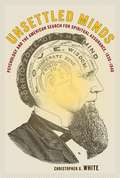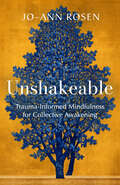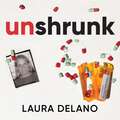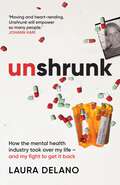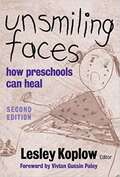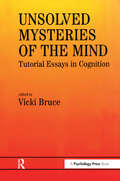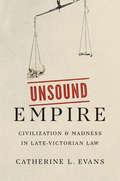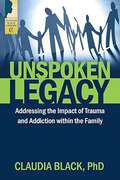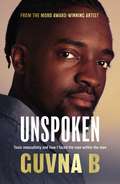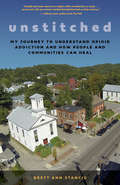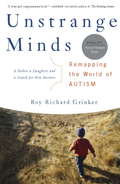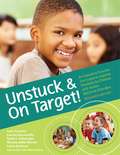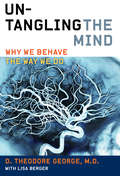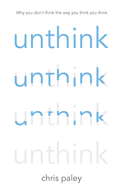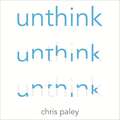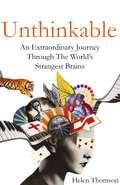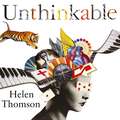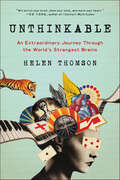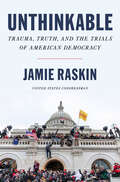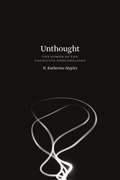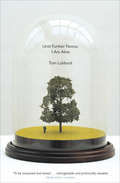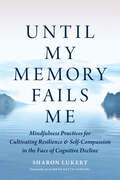- Table View
- List View
Unsettled Minds: Psychology and the American Search for Spiritual Assurance, 1830–1940
by Christopher G. WhiteThe book examines the concept of religion by turning to the religious lives of nineteenth- and twentieth-century Americans who rejected older religious traditions and turned to scientific psychologies to help them formulate new ideas about the self and new practices concerning spiritual growth.
Unshakeable: Trauma-Informed Mindfulness for Collective Awakening
by Jo-ann RosenA holistic system for gaining and maintaining the stability of mind needed for personal and social transformation, even in the midst of trauma—with simple, body-based exercises grounded in neuroscience and mindfulness, inspired by Thich Nhat HanhWith three decades working in marginalized communities in the US, Israel, and the West Bank, mindfulness teacher and psychotherapist Jo-ann Rosen offers a wealth of wisdom and gentle humor in supporting people to access their inner strength and stability—even amidst outer chaos and catastrophe. Rosen draws on the example and practices of her teacher, the peace activist and Vietnamese Buddhist monk Thich Nhat Hanh, who founded Plum Village mindfulness practice centers worldwide as places of healing and restoration, to show how meditation can aid collective awakening. Time and time again, even in places where trauma is commonplace, Rosen has seen that a regulated nervous system allows an individual to move from overwhelm and despair to stability and engagement. The Plum Village approach to well-being cultivates resilience while recognizing the unique social and ecological challenges of our times. In Unshakeable, Rosen shares the methods by which we can broaden our resiliency, calm our nerves, and positively impact the collective consciousness. By following the practices in this book, we can find an unshakeable source of strength within, not only as individuals, but also as members of strong communities for positive change.
Unshrunk: How The Mental Health Industry Took Over My Life - And My Fight to Get it Back
by Laura DelanoOne of Lit Hub's Most Anticipated Books of 2025A really moving and heart-rending story. Unshrunk will help and empower so many people.JOHANN HARI, author of Stolen Focus and Lost ConnectionsUnshrunk is the story of a young woman who dared to be herself, and a potent reminder of why human suffering can never be reduced to a diagnostic manual. A must read for anyone probing the dark side of mental health treatment. ANNA LEMBKE, author of Dopamine Nation'A wonderful, incisive and deeply moving book... provides a rare glimpse behind the curtain of a profession in peril.'DR JAMES DAVIES, AUTHOR OF CRACKED AND SEDATES'Inspiring... A wake-up call about a deeply flawed system'PROFESSOR JOANNA MONCRIEFFIn this gripping, essential memoir, Laura Delano takes readers through the labyrinth of the American mental health system, where 'the best available care' left her sicker, more desperate, and more lost than ever before. This beautiful, rageful, joyful book is a beacon for all seeking a life beyond labels, beyond medication, beyond disorder.JESSICA NORDELL, AUTHOR OF THE END OF BIAS: A BEGINNING***I began to think about the forces at play, not just within me, but beyond me. What if my life hadn't fallen apart in the way that it had because of 'treatment-resistant mental illness', as I'd been led to believe, but because of the treatment itself?At age fourteen, Laura Delano's parents took her to her first psychiatrist. At school, she was the model student, but at home Laura felt an uncontrollable rage that she unleashed on family, friends and herself. She was promptly diagnosed with bipolar disorder and started on a course of mood stabilizers and antidepressants. It was to mark the beginning of a painful and relentless journey. For the next thirteen years, Laura sought help from the best psychiatrists and hospitals, accumulating an ever-expanding list of diagnoses and prescriptions for nineteen different drugs. She accepted her diagnoses and embraced the pharmaceutical regime she'd been told was necessary to manage her incurable, lifelong disease. But as her symptoms only got more severe and eventually she was deemed 'treatment resistant', Laura began to wonder if the drugs and diagnoses were the cure - or had they become the problem?Weaving together Laura's medical records and doctors' notes with illuminating research on the drugs she was prescribed, Unshrunk is the powerful memoir of one woman's battle against the commercial psychiatric industry and the role it plays in shaping what it means to be human.
Unshrunk: How The Mental Health Industry Took Over My Life - And My Fight to Get it Back
by Laura DelanoOne of Lit Hub's Most Anticipated Books of 2025A really moving and heart-rending story. Unshrunk will help and empower so many people.JOHANN HARI, author of Stolen Focus and Lost ConnectionsUnshrunk is the story of a young woman who dared to be herself, and a potent reminder of why human suffering can never be reduced to a diagnostic manual. A must read for anyone probing the dark side of mental health treatment. ANNA LEMBKE, author of Dopamine Nation'A wonderful, incisive and deeply moving book... provides a rare glimpse behind the curtain of a profession in peril.'DR JAMES DAVIES, AUTHOR OF CRACKED AND SEDATES'Inspiring... A wake-up call about a deeply flawed system'PROFESSOR JOANNA MONCRIEFFIn this gripping, essential memoir, Laura Delano takes readers through the labyrinth of the American mental health system, where 'the best available care' left her sicker, more desperate, and more lost than ever before. This beautiful, rageful, joyful book is a beacon for all seeking a life beyond labels, beyond medication, beyond disorder.JESSICA NORDELL, AUTHOR OF THE END OF BIAS: A BEGINNING***I began to think about the forces at play, not just within me, but beyond me. What if my life hadn't fallen apart in the way that it had because of 'treatment-resistant mental illness', as I'd been led to believe, but because of the treatment itself?At age fourteen, Laura Delano's parents took her to her first psychiatrist. At school, she was the model student, but at home Laura felt an uncontrollable rage that she unleashed on family, friends and herself. She was promptly diagnosed with bipolar disorder and started on a course of mood stabilizers and antidepressants. It was to mark the beginning of a painful and relentless journey. For the next thirteen years, Laura sought help from the best psychiatrists and hospitals, accumulating an ever-expanding list of diagnoses and prescriptions for nineteen different drugs. She accepted her diagnoses and embraced the pharmaceutical regime she'd been told was necessary to manage her incurable, lifelong disease. But as her symptoms only got more severe and eventually she was deemed 'treatment resistant', Laura began to wonder if the drugs and diagnoses were the cure - or had they become the problem?Weaving together Laura's medical records and doctors' notes with illuminating research on the drugs she was prescribed, Unshrunk is the powerful memoir of one woman's battle against the commercial psychiatric industry and the role it plays in shaping what it means to be human.
Unsmiling Faces: How Preschools Can Heal
by Vivian Gussin Paley Lesley KoplowThe first edition of this indispensable book set the standard for high-quality intervention and prevention programs in early childhood practice. Since its publication, many new forces have impacted the landscape of early childhood education, presenting both great opportunities and great risks for today’s emotionally fragile young children. Once again making complex psychological concepts accessible to classroom teachers, this thorough revision: <p><p> Incorporates important understandings gained since the tragic events of 9/11. <p><p> Addresses many of the challenging issues that confront educators in the current high-pressure climate focused on academic performance. Includes recent scientific research that supports the concepts underlying high-quality intervention and prevention in early childhood practice—concepts that were the basis for the first edition of this book. <p><p> Provides an essential framework to help teachers understand the emotional lives of the young children they serve.
Unsolved Mysteries of The Mind: Tutorial Essays In Cognition
by Vicki BruceThis textbook is for use in tutorials and seminars by psychology, neuroscience and cognitive science undergraduates studying cognition. The book complements standard course texts in cognition by providing a series of articles which emphasize particularly what we do not understand, rather than what we think we do. It considers a selection of problems and phenomena that remain mysterious despite years, decades or centuries of enquiry, and evaluates different approaches to these problems.; The topics discussed range from specific optical illusions to the nature of consciousness. Some of these unsolved problems provide a vehicle for reviewing different paradigms and shifts in the field over the 20th century. Each chapter also poses some of the remaining unanswered questions, suggesting directions for future enquiry.
Unsound Empire: Civilization and Madness in Late-Victorian Law
by Catherine L. EvansA study of the internal tensions of British imperial rule told through murder and insanity trialsUnsound Empire is a history of criminal responsibility in the nineteenth‑century British Empire told through detailed accounts of homicide cases across three continents. If a defendant in a murder trial was going to hang, he or she had to deserve it. Establishing the mental element of guilt—criminal responsibility—transformed state violence into law. And yet, to the consternation of officials in Britain and beyond, experts in new scientific fields posited that insanity was widespread and growing, and evolutionary theories suggested that wide swaths of humanity lacked the self‑control and understanding that common law demanded. Could it be fair to punish mentally ill or allegedly “uncivilized” people? Could British civilization survive if killers avoided the noose?
Unspoken Legacy: Addressing the Impact of Trauma and Addiction within the Family
by Claudia BlackA far-ranging examination of how the effects of addiction and trauma in the family can reverberate for generations <P><P> Trauma and addictive disorders are often a result of psychological injuries experienced as a child. These injuries typically produce long-term and harmful generational consequences on loved ones and other family members. Claudia Black presents a searing portrait of a broken family system, exploring how addiction and trauma develop and how their damaging repetition uproots and frequently destroys one's family tree. Filled with vignettes highlighting the various causes of trauma, Dr. Black helps readers understand its physiology and psychology and gives them healing, proactive steps to build healthier relationships. <P><P> Claudia Black, PhD, is internationally recognized for her pioneering and cutting-edge work with family systems and addictive disorders. Her work with children affected by drug and alcohol addiction in the late 1970s fueled the advancement of the codependency and developmental trauma fields. Dr. Black's passion to help young adults overcome obstacles and strengthen families built the foundation of the Claudia Black Young Adult Center at The Meadows. Not only is Dr. Black the clinical architect of this innovative treatment program, she is also actively involved with the treatment team, patients, and their families.
Unspoken Politics: Implicit Attitudes and Political Thinking (Cambridge Studies in Public Opinion and Political Psychology)
by Efrén O. PérezThis book explains why people acquire implicit attitudes, how they affect political thinking, and where in the mass public they have their strongest - and weakest - influences. A theoretically ambitious book, Unspoken Politics establishes that implicit attitudes exist outside the tightly controlled confines of the laboratory, showing that they emerge in a public opinion survey setting, which underlines their real-world impact. It also lays bare, in painstaking detail, the mechanics of a leading measure of implicit attitudes, the implicit association test (IAT). Accordingly, it outlines the strengths and limitations of this measure, while providing an illustration of how to develop an IAT for one's own purposes. By explaining how to analyze and interpret the data produced by the IAT, this book leads to a better understanding of people's unspoken cognitions and the impacts these have on the politics that individuals openly profess. Mounts an extended conceptualization of implicit attitudes and their implications for political thinking. Illuminates the mechanics of a leading measure of implicit attitudes, the Implicit Association Test, and applies it to US immigration politics. Will appeal to those scholars who are in need of theoretical guidance about the political impact of implicit attitudes on mass decision-making.
Unspoken: A sexy, emotional second-chance romance (Start Up in the City #2)
by Kelly RimmerUnspoken is a unforgettable new romance from bestselling author Kelly Rimmer, in her Start Up in the City series, perfect for fans of Jill Shalvis and Nora Roberts.'Simultaneously deliciously intense and achingly tender. The authentic push and pull of this complex relationship is sure to resonate with readers' Publishers WeeklySometimes it's what you don't say that can change everything...Isabel Winton had planned to spend the last few days of her marriage at her vacation home, intending to reflect, regroup...or maybe just do some solitary sulking. Instead, she collides with her almost ex, Paul, who has the same idea. Too stubborn to leave, Isabel figures this is a chance for them to get some closure. But she's astonished to see that months apart have transformed her emotionally aloof husband into 'Paul 2.0', more open than ever before.Paul was blindsided when Isabel left him. He had no idea she felt he was more committed to his career than to their marriage. With his new, hard-won self-awareness, he blames himself for letting her walk away. But winning her back will take more than simple words. It'll mean finding the courage to grow, to trust, and grab a second chance at life by each other's sides.Praise for Kelly Rimmer: 'Guaranteed to please... Kelly Rimmer should be at the top of the must-read list' Fresh Fiction 'Will delight fans of extremely modern romance' Publishers Weekly
Unspoken: Toxic Masculinity and How I Faced the Man Within the Man
by Guvna BMen are bold. Men are brave. Men are strong in the face of fear. But what happens when that strength crumbles? Growing up on a council estate in East London, rapper Guvna B thought he knew everything he needed to know about what it means to be a man. But when a personal tragedy sent him reeling, he knew he had to face these assumptions head on if he was going to be able to overcome his grief. In this intimate, honest and unflinching memoir, Guvna B draws on his personal experiences to explore how toxic masculinity affects young men today. Exploring ideas of male identity, UNSPOKEN is an inspirational account of Guvna’s journey.
Unstitched: My Journey to Understand Opioid Addiction and How People and Communities Can Heal
by Brett Ann StanciuWhat if society looked at addiction without judgement? Unstitched shares the powerful story of one librarian&’s quest to understand the impact of addiction fed by stigma and inevitable secrecy.The opioid epidemic has hit people in communities large and small and across all socio-economic classes. What should each of us know about it, and do about it? Unstitched moves readers from feelings of helplessness and blame into empathy, ultimately helping friends, family, and community members separate the disease of addiction from the person underneath.A stranger, rumored to be a heroin addict, repeatedly breaks into the small-town library Brett Ann Stanciu runs. After she tries to get law enforcement to take meaningful action against him—elementary school children and young parents with babies frequent the place after all—he dies by suicide. When she realizes how little she knows about opioid misuse, she sets out on a mission, seeking insight from others, such as people in recovery, treatment providers, the town police chief, and Vermont's US attorney. Stanciu&’s journey leads to compassionate generosity, renewed faith, and ultimately a measure of personal redemption as she realizes she has a role to play in helping the people of her community stitch themselves back together.
Unstrange Minds: Remapping the World of Autism
by Grinker Roy RichardThis global exploration of autism by an award-winning scientist-and father of an autistic child-shows that an apparent ?epidemicOCO signals surprising new promise for better diagnosis and treatment"
Unstuck and On Target!: An Executive Function Curriculum to Improve Flexibility for Children with Autism Spectrum Disorders
by Laura Anthony Lauren Kenworthy Lynn Cannon Katie C. Alexander Monica Adler Werner John Elder RobinsonFor students with autism disorders, problems with flexibility and goal-directed behaviour can be a major obstacle to success in school and in life. But flexibility and goal-setting can be taught just like any other skill, and this how-to-manual equips professionals with simple, real-world ways to help students with ASD develop this critical aspect of executive function. A classroom-based intervention approach for high-functioning students ages 8 - 11, this innovative guide gives special educators and other service providers ready-to-use lessons that promote cognitive and behavioural flexibility in everyday situations, from compromising with peers to handling schedule changes. Developed by a multidisciplinary team of reserachers and front-line professionals, the 27 lessons in Unstuck and On Target!: are tested and proven; reflect the learning style of students with ASD; target specific skills every student needs to learn more effectively and participate successfully in the classroom; free up teacher time; fit easily into any curriculum; and make learning fun. Ready for any professional to pick up and use, this complete guide gives users clear instruction, materials lists, and modifications for each lesson, plus invaluable Teacher Intervention Tips that help general educators reinforce the lessons throughout the school day.
Untangling the Mind: Why We Behave the Way We Do
by David Theodore George Lisa BergerFree yourself from emotional turmoileven when that turmoil is caused by others!We have a much greater understanding of human behavior now than we did just a few decades ago. Yet even with this greater understanding of the human mind, why we do what we do can sometimes seem like a mystery. People are often left with unsettling questions about their own (or others') behavior.We ask ourselves, Why did I make a spectacle of myself? Why am I so stressed? Why am I constantly so negative?In his years as a clinician, Dr. Ted George has been struck by how much easier it is for people to say they have a physical illness than it is to admit they feel out of control with an emotion—be it anger, fear, or depression. With a physical issue, you have the source of the problem in concrete terms, such as in a lab report, but with an emotional issue, it can be much harder to define what's gone wrong. Untangling the Mind helps make sense of what's happening—and why. With knowledge of how the brain translates sensory signals into emotions, you will increase your understanding of your own—and others'—behaviors. As you learn about your psychological and neurological makeup, you will begin to see new possibilities for optimism, motivation, and well-being. We can control our behavior and our feelings, no matter how much they may have ruled us in the past, and Dr. George helps us know how. Once you understand the deeply rooted instincts that activate your emotions, you can live more peacefully, behave in ways that are more in keeping with the person you'd like to be, and enjoy your life more fully. And you'll be better able to remain unaffected by the drama of other people's emotional storms.
Unthink: And how to harness the power of your unconscious
by Chris PaleyYour life is dominated by your unconscious mind: by thoughts you're unaware of and movements you don't realise you are making. Words, colours, mannerisms and other cues you don't realise are affecting you, change what you think. The confidence you have in your ability to reason and to consciously choose what to do is caused by a series of illusions that scientists are only just beginning to understand. The discovery of these illusions will change the way we see ourselves more than the discoveries of Darwin and Copernicus. Unthink explores the unconscious decisions we make, and covers a variety of topics, ranging from how we choose politicians and romantic partners to more abstract subjects such as whether we can consciously decide to move our fingers. The counter-intuitive observations that Chris makes in the book include: · If you want someone to fancy you, wear red and meet them somewhere frightening. · When waitresses repeat customers' orders back to them instead of just saying 'yes' they receive bigger tips. · To reduce your shopping bill, start at the beer and snacks end of the store and work backwards. · If you sit someone in an upright chair when you give them good news they will be prouder of their achievements. · Having a picture of your family on your desk might make you work harder, but you'll be rattier when you get home! Chris Paley shows us how we can understand ourselves and others better, by having a greater understanding of the way that the unconscious mind has an impact of the way we live our lives.
Unthink: And how to harness the power of your unconscious
by Chris PaleyYour life is dominated by your unconscious mind: by thoughts you're unaware of and movements you don't realise you are making. Words, colours, mannerisms and other cues you don't realise are affecting you, change what you think. The confidence you have in your ability to reason and to consciously choose what to do is caused by a series of illusions that scientists are only just beginning to understand. The discovery of these illusions will change the way we see ourselves more than the discoveries of Darwin and Copernicus. Unthink explores the unconscious decisions we make, and covers a variety of topics, ranging from how we choose politicians and romantic partners to more abstract subjects such as whether we can consciously decide to move our fingers. The counter-intuitive observations that Chris makes in the book include:· If you want someone to fancy you, wear red and meet them somewhere frightening.· When waitresses repeat customers' orders back to them instead of just saying 'yes' they receive bigger tips.· To reduce your shopping bill, start at the beer and snacks end of the store and work backwards.· If you sit someone in an upright chair when you give them good news they will be prouder of their achievements.· Having a picture of your family on your desk might make you work harder, but you'll be rattier when you get home!Chris Paley shows us how we can understand ourselves and others better, by having a greater understanding of the way that the unconscious mind has an impact of the way we live our lives.
Unthink: And how to harness the power of your unconscious
by Chris PaleyYour life is dominated by your unconscious mind: by thoughts you're unaware of and movements you don't realise you are making. Words, colours, mannerisms and other cues you don't realise are affecting you, change what you think. The confidence you have in your ability to reason and to consciously choose what to do is caused by a series of illusions that scientists are only just beginning to understand. The discovery of these illusions will change the way we see ourselves more than the discoveries of Darwin and Copernicus. Unthink explores the unconscious decisions we make, and covers a variety of topics, ranging from how we choose politicians and romantic partners to more abstract subjects such as whether we can consciously decide to move our fingers. The counter-intuitive observations that Chris makes in the book include:· If you want someone to fancy you, wear red and meet them somewhere frightening.· When waitresses repeat customers' orders back to them instead of just saying 'yes' they receive bigger tips.· To reduce your shopping bill, start at the beer and snacks end of the store and work backwards.· If you sit someone in an upright chair when you give them good news they will be prouder of their achievements.· Having a picture of your family on your desk might make you work harder, but you'll be rattier when you get home!Chris Paley shows us how we can understand ourselves and others better, by having a greater understanding of the way that the unconscious mind has an impact of the way we live our lives.(P)2014 Hodder & Stoughton
Unthinkable: An Extraordinary Journey Through the World's Strangest Brains
by Helen Thomson'Wonderfully clear, fluent and eye-opening' THE TIMES'A stirring scientific journey, a celebration of human diversity and a call to rethink the "unthinkable"' NATURE'An utterly fascinating romp around the nether regions of the human mind' BIG ISSUEIMAGINE . . . getting lost in a one-room flat; seeing auras; never forgetting a moment; a permanent orchestra in your head; turning into a tiger; life as an out-of-body experience; feeling other people's pain; being convinced you are dead; becoming a different person overnight.Our brains are far stranger than we think. We take it for granted that we can remember, feel emotion, navigate, empathise and understand the world around us, but how would our lives change if these abilities were dramatically enhanced - or disappeared overnight? Award-winning science writer Helen Thomson has spent years travelling the world tracking down incredibly rare brain disorders. In Unthinkable she tells the stories of nine extraordinary people. From the man who thinks he's a tiger to the doctor who feels the pain of others just by looking at them, their experiences illustrate how the brain can shape our lives in unexpected and, in some cases, brilliant and alarming ways. Delving into the rich histories of these conditions, exploring the very latest research and cutting-edge medical techniques, Thomson explains the workings of our consciousness, our emotions, our creativity and even the mechanisms that allow us to understand our own existence. Story by remarkable story, Unthinkable takes us on an unforgettable journey through the human brain. Discover how to forge memories that never disappear, how to grow an alien limb and how to make better decisions. Learn how to hallucinate and how to make yourself happier in a split second. Find out how to avoid getting lost, how to see more of your reality, even how exactly you can confirm you are alive. Think the unthinkable.
Unthinkable: An Extraordinary Journey Through the World's Strangest Brains
by Helen ThomsonHow the mind works -- everything from memory to emotion, navigation to creativity -- explained in nine extraordinary human stories.IMAGINE . . . getting lost in a one-room flat; seeing auras; never forgetting a moment; a permanent orchestra in your head; turning into a tiger; life as an out-of-body experience; feeling other people's pain; being convinced you are dead; becoming a different person overnight.Our brains are far stranger than we think. We take it for granted that we can remember, feel emotion, navigate, empathise and understand the world around us, but how would our lives change if these abilities were dramatically enhanced - or disappeared overnight? Award-winning science writer Helen Thomson has spent years travelling the world tracking down incredibly rare brain disorders. In Unthinkable she tells the stories of nine extraordinary people. From the man who thinks he's a tiger to the doctor who feels the pain of others just by looking at them, their experiences illustrate how the brain can shape our lives in unexpected and, in some cases, brilliant and alarming ways. Delving into the rich histories of these conditions, exploring the very latest research and cutting-edge medical techniques, Thomson explains the workings of our consciousness, our emotions, our creativity and even the mechanisms that allow us to understand our own existence. Story by remarkable story, Unthinkable takes us on an unforgettable journey through the human brain. Discover how to forge memories that never disappear, how to grow an alien limb and how to make better decisions. Learn how to hallucinate and how to make yourself happier in a split second. Find out how to avoid getting lost, how to see more of your reality, even how exactly you can confirm you are alive. Think the unthinkable.(P)2018 John Murray Press
Unthinkable: An Extraordinary Journey Through the World's Strangest Brains
by Helen ThomsonIn this Indiebound bestseller, the award-winning science writer unlocks the biggest mysteries of the human brain by examining nine extraordinary cases.Our brains are far stranger than we think. We take it for granted that we can remember, feel emotion, navigate, empathize and understand the world around us, but how would our lives change if these abilities were dramatically enhanced—or disappeared overnight?Helen Thomson has spent years travelling the world, tracking down incredibly rare brain disorders. In Unthinkable she tells the stories of nine extraordinary people she encountered along the way. From the man who thinks he’s a tiger to the doctor who feels the pain of others just by looking at them to a woman who hears music that’s not there, their experiences illustrate how the brain can shape our lives in unexpected and, in some cases, brilliant and alarming ways.Story by remarkable story, Unthinkable takes us on an unforgettable journey through the human brain. Discover how to forge memories that never disappear, how to grow an alien limb and how to make better decisions. Learn how to hallucinate and how to make yourself happier in a split second. Find out how to avoid getting lost, how to see more of your reality, even how exactly you can confirm you are alive. Think the unthinkable.“Helen Thomson’s remarkable book is an astonishing tour of the human brain in all its awesome power and bewildering variation . . . Unthinkable will enrich your brain, blow your mind, and warm your heart.” —Ed Yong, Pulitzer Prize-winning author
Unthinkable: Trauma, Truth, and the Trials of American Democracy
by Jamie RaskinIn this searing memoir, Congressman Jamie Raskin tells the story of the forty-five days at the start of 2021 that permanently changed his life—and his family’s—as he confronted the painful loss of his son to suicide, lived through the violent insurrection in our nation’s Capitol, and led the impeachment effort to hold President Trump accountable for inciting the political violence. <p><p> On December 31, 2020, Tommy Raskin, the only son of Maryland Congressman Jamie Raskin, tragically took his own life after a long struggle with depression. Seven days later on January 6, Congressman Raskin returned to Congress to help certify the 2020 Presidential election results, when violent insurrectionists led by right wing extremist groups stormed the U.S. Capitol hoping to hand four more years of power to President Donald Trump. <p><p> As our reeling nation mourned the deaths of numerous people and lamented the injuries of more than 140 police officers hurt in the attack, Congressman Raskin, a Constitutional law professor, was called upon to put aside his overwhelming grief—both personal and professional—and lead the impeachment effort against President Trump for inciting the violence. Together this nine-member team of House impeachment managers riveted a nation still in anguish, putting on an unprecedented Senate trial that produced the most bipartisan Presidential impeachment vote in American history. <p><p> Now for the first time, Congressman Raskin discusses this unimaginable convergence of personal and public trauma, detailing how the painful loss of his son and the power of Tommy’s convictions fueled the Congressman’s work in the aftermath of modern democracy’s darkest day. Going inside Congress on January 6, he recounts the horror of that day, a day that he and other Democrats had spent months preparing for under the correct assumption that they would encounter an attempted electoral coup—not against a President but for one. And yet, on January 6, he faced the one thing he had failed to anticipate: mass political violence designed to block Biden’s election. <p><p> With an inside account of leading the team prosecuting President Trump in the Senate, Congressman Raskin shares never before told stories of just how close we came to losing our democracy that fateful day and lays out the methodical prosecution that convinced Democrats and Republicans alike of Trump’s responsibility for inciting insurrectionary violence against our government. <p><p> Through it all, he reckons with the loss of his brilliant, remarkable son, a Harvard Law student whose values and memory continually inspired the Congressman to confront the dark impulses unleashed by Donald Trump. At turns, a moving story of a father coping with his pain and a revealing examination of holding President Trump accountable for the violence he fomented, this book is a vital reminder of the ongoing struggle for the soul of American democracy and the perseverance that our Constitution demands from us all.
Unthought: The Power of the Cognitive Nonconscious
by N. Katherine HaylesN. Katherine Hayles is known for breaking new ground at the intersection of the sciences and the humanities. In Unthought, she once again bridges disciplines by revealing how we think without thinking—how we use cognitive processes that are inaccessible to consciousness yet necessary for it to function. Marshalling fresh insights from neuroscience, cognitive science, cognitive biology, and literature, Hayles expands our understanding of cognition and demonstrates that it involves more than consciousness alone. Cognition, as Hayles defines it, is applicable not only to nonconscious processes in humans but to all forms of life, including unicellular organisms and plants. Startlingly, she also shows that cognition operates in the sophisticated information-processing abilities of technical systems: when humans and cognitive technical systems interact, they form “cognitive assemblages”—as found in urban traffic control, drones, and the trading algorithms of finance capital, for instance—and these assemblages are transforming life on earth. The result is what Hayles calls a “planetary cognitive ecology,” which includes both human and technical actors and which poses urgent questions to humanists and social scientists alike. At a time when scientific and technological advances are bringing far-reaching aspects of cognition into the public eye, Unthought reflects deeply on our contemporary situation and moves us toward a more sustainable and flourishing environment for all beings.
Until Further Notice, I Am Alive
by Tom Lubbock&“These are thoughts for us all, sooner or later—and this is a book I'll keep with me, as long as I live.&”—David Sexton, The Scotsman In 2008, art critic Tom Lubbock was diagnosed with a rare brain tumor and told he had only two years to live. Physically fit and healthy, and suffering from few symptoms, he faced his death with the same directness and courage that had marked the rest of his life. Lubbock was renowned for the clarity and unconventionality of his writing, and his characteristic fierce intelligence permeates this extraordinary chronicle. With unflinching honesty and curiosity, he repeatedly turns over the fact of his mortality, as he wrestles with the paradoxical question of how to live, knowing we&’re going to die. Defying the initial diagnosis, Tom survived for three years. He savored his remaining days; engaging with books, art, friends, his wife and their young son, while trying to stay focused on the fact of his impending death. There are medical details—he vividly describes the slow process of losing control over speech as the tumor gradually pressed down on the area of his brain responsible for language—but this is much more than a book about illness; rather, it's a book about a man who remains in thrall to life, as he inches closer to death. &“I hope that if I am ever diagnosed with a terminal illness I will remember to reread Until Further Notice, I Am Alive. It is, in its tough-minded way, truly joyous.&”—Lynn Barber, Sunday Times
Until My Memory Fails Me: Mindfulness Practices for Cultivating Resilience and Self-Compassion in the Face of Cognitive Decline
by Sharon LukertA definitive guide for navigating cognitive decline using mindfulness and meditation practices that includes practical advice and poignant stories from a Buddhist chaplain diagnosed with Mild Cognitive Impairment.When Buddhist chaplain Sharon Lukert was diagnosed with Mild Cognitive Impairment (MCI), she turned to spiritual practice and community to help her adjust to a new and ever-shifting reality. In Until My Memory Fails Me, she shares her hard-won wisdom as a guide for anyone standing at the gateway of cognitive decline.Through poignant storytelling and practical wisdom, Lukert offers specific ways to build resilience against the emotional swings and existential fear inherent in cognitive decline. The book includes:Instructions for more than a dozen mindfulness and meditation exercises, including The Handshake, Just Like Me, Open Awareness Meditation, and Tonglen (Lovingkindness) MeditationPractical advice on topics like understanding your diagnosis, how to talk to your medical providers, testing, dealing with bias, how to maintain communication, and managing new symptomsStories, advice, and encouragement from her peers in the MCI community and her &“dementia ancestors,&” those she worked with in her decades as a Buddhist chaplain in healthcare settingsWith raw vulnerability, Lukert demonstrates how to find courage, acceptance, and compassion even as your sense of self shifts underneath you.The first mindfulness book written specifically for people with MCI, the practices and lessons Lukert shares are also valuable for anyone experiencing cognitive decline caused by other disorders, as well as for loved ones and caregivers.
